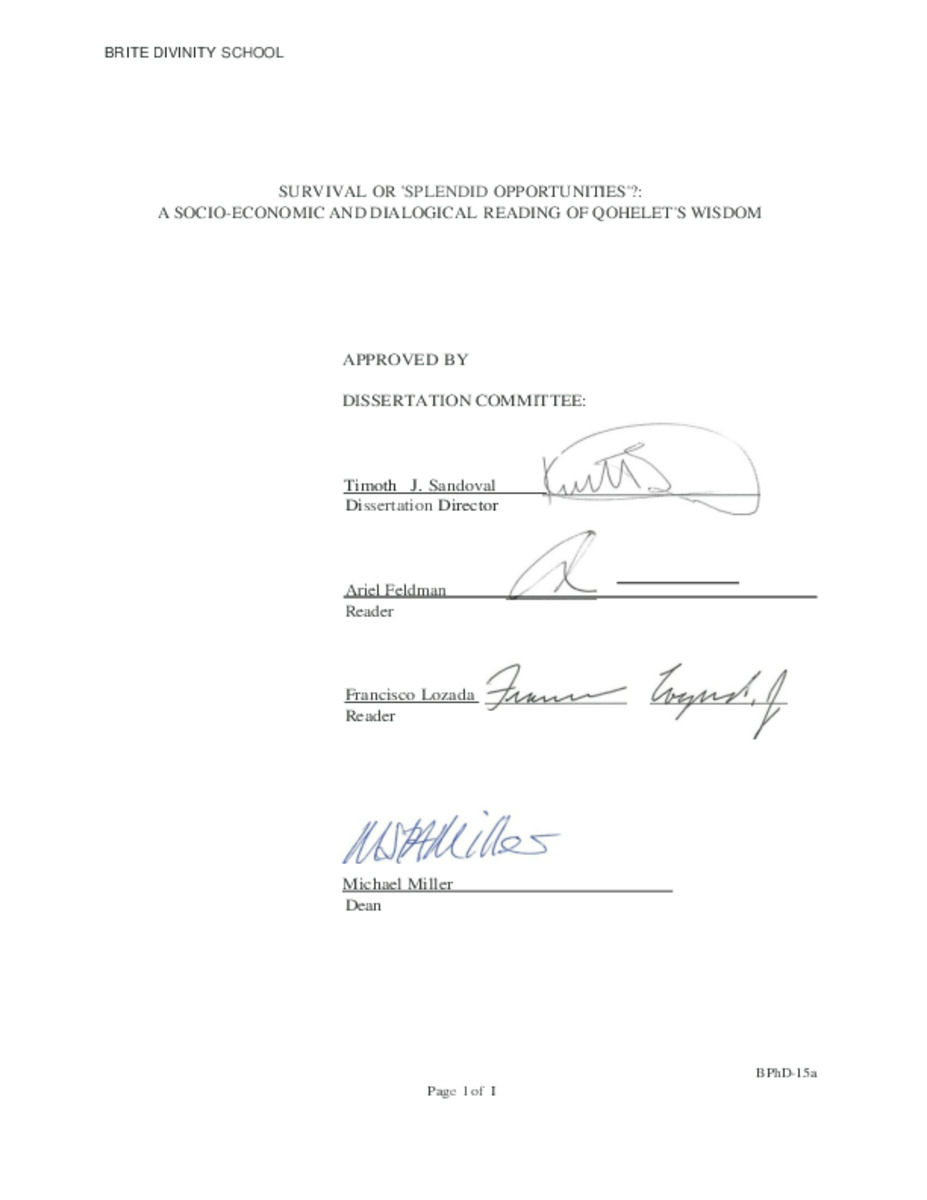Survival or ‘splendid opportunities’?: A socio-economic and dialogical reading of Qohelet's WisdomShow full item record
| Title | Survival or ‘splendid opportunities’?: A socio-economic and dialogical reading of Qohelet's Wisdom |
|---|---|
| Author | Hayes, Marcus |
| Date | 2023-03-31 |
| Genre | Dissertation |
| Abstract | Within this dissertation I intend to study how Qohelet’s discourse on wisdom is a product of larger socio-economic realities and webs of intertextuality. This project will attempt to work out these central questions: How is wisdom conceptualized within Qohelet, and more precisely, how is this conceptualization 1. related to the socio-economic factors of the Ptolemaic imperial regime in third century BCE Judea—the proposed time and place of Qohelet’s composition (see below); and 2. a function of an intertextual dialogue amongst other cotemporaneous societal perspectives and textual traditions—in particular the book of Proverbs and the Tobiad Romance, a text preserved within Josephus’ Jewish Antiquities (Ant. 12.4.1-11 §154-236)? I propose that within Qohelet wisdom (¿¿¿¿) plays an important, yet limited, role in the text’s attempt to describe an adequate way to negotiate the socio-economic realities of Ptolemaic Palestine characterized by the exploitation of agricultural extraction, debt slavery, and bureaucratic hierarchies. In the earlier and “paradigmatic” wisdom book of Proverbs, although there is clearly value placed on a person being “practically wise” in their navigation of the world, the text’s “traditional” conception of wisdom most fundamentally represents an ethical quality; wisdom for Proverbs is centered around forming virtuous persons who through their wisdom are able to pursue and achieve a measure of flourishing and well-being. Conversely, the Tobiad Romance suggests that the exercise of a kind of “wisdom,” conceived primarily as cleverness and wit in relation to the Ptolemaic royal court, ensures the survival of the Judean polity, even as it authorizes elite participation within the extractive and unjust Ptolemaic political and economic structures. Put otherwise, this tale frames participation in the Ptolemaic extractive regime as necessary for the well-being of the Judean community, even though such participation functions to ensure the economic prospering of only elite figures like the Tobiads, often at the expense of non-elite producers (tenant farmers, slaves, small scale landowners, etc.). Qohelet, in a way that is similar to but also distinct from both Proverbs and the Tobiad Romance, represents a narrowly pragmatic view of wisdom as knowledge and a set of practical skills. However, Qohelet also perceives much more fully and critically than does the Tobiad Romance the ephemerality and instability of successful participation in the Ptolemaic economic and social structures, as well as the persistent injustice that pervades the imperium’s social and economic hierarchies. As a result, Qohelet sees wisdom neither as a moral practice of the virtues that enables a life of flourishing—when/if there is access to material resources (as in Proverbs)—nor as that which guarantees a substantial political and economic payoff (as in the Tobiad Romance); Qohelet, rather, believes that wisdom can be possessed by those who neither flourish nor have much hope for flourishing, given that they likely won’t be able to enjoy sufficient political and economic resources to do so (e.g., Qoh 4:13; 9:11, 15). Instead, wisdom for Qohelet represents a kind of shrewd knowledge and practical skill that helps one to survive in the daily struggle of living in a world fraught with economic exploitation and a lack of moral retribution; it makes possible survival as one negotiates the Ptolemaic imperial objective of economic extraction. Arising from this socio-economic and dialogical context, Qohelet values wisdom for its ability to offer a profit (¿¿¿¿¿) that amounts not to flourishing as with Proverbs, nor extravagant elite success (which if obtained is always fleeting) as with the Tobiad Romance, but to survival, an occasional bit of shade for those “living under the sun” (Qoh 7:12). |
| Link | https://repository.tcu.edu/handle/116099117/59445 |
| Department | Brite Divinity School |
| Advisor | Sandova, Timothy J Sandova |
Files in this item
This item appears in the following Collection(s)
- Doctoral Dissertations [1497]
© TCU Library 2015 | Contact Special Collections |
HTML Sitemap



